Company Law Assignment: Director's Rights, Duties, and Legal Issues
VerifiedAdded on 2021/05/31
|10
|2474
|70
Report
AI Summary
This report analyzes a company law case involving a dispute between directors of Clix & Trix Ltd. The report addresses several key issues, including the rights of each director under the law, the implications of Mark's approved leave, and whether Mark has been subjected to prejudicial treatment. It also examines whether Dan had the right to enter into a contract without the other members' consent and the repercussions of Mark's actions, such as using Dan's password to access company information and contacting customers outside of business hours. The report references relevant legislation, including the Criminal Damage Act 1991, the Criminal Justice (Theft and Fraud Offences) Act 2001, and the Companies Act 2014, as well as key legal precedents such as Foss v Harbottle, Edwards v Halliwell, and Cook v Deeks. The analysis considers directors' duties, minority shareholder rights, and potential breaches of the law, providing a comprehensive overview of the legal complexities involved.
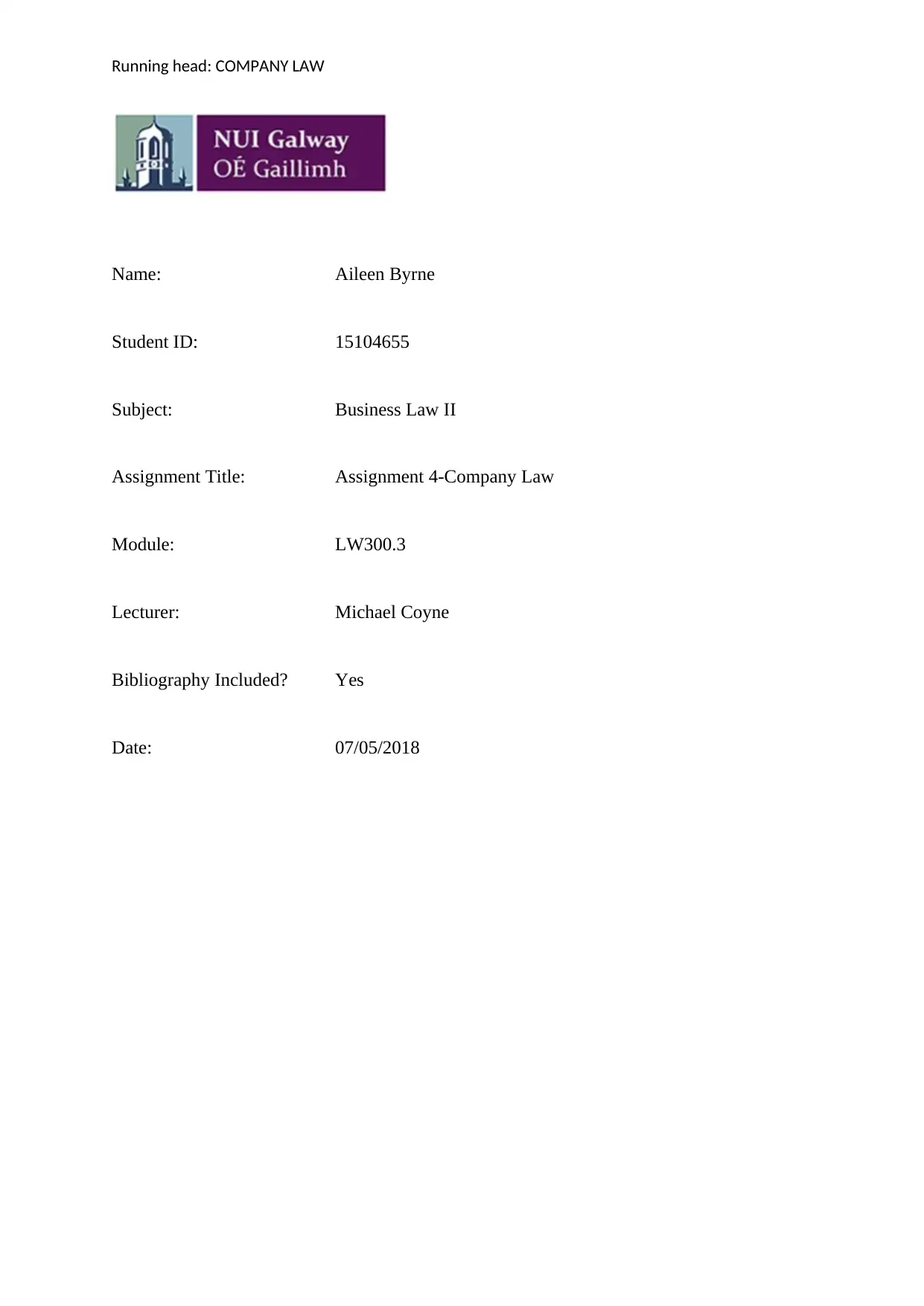
Running head: COMPANY LAW
Name: Aileen Byrne
Student ID: 15104655
Subject: Business Law II
Assignment Title: Assignment 4-Company Law
Module: LW300.3
Lecturer: Michael Coyne
Bibliography Included? Yes
Date: 07/05/2018
Name: Aileen Byrne
Student ID: 15104655
Subject: Business Law II
Assignment Title: Assignment 4-Company Law
Module: LW300.3
Lecturer: Michael Coyne
Bibliography Included? Yes
Date: 07/05/2018
Paraphrase This Document
Need a fresh take? Get an instant paraphrase of this document with our AI Paraphraser
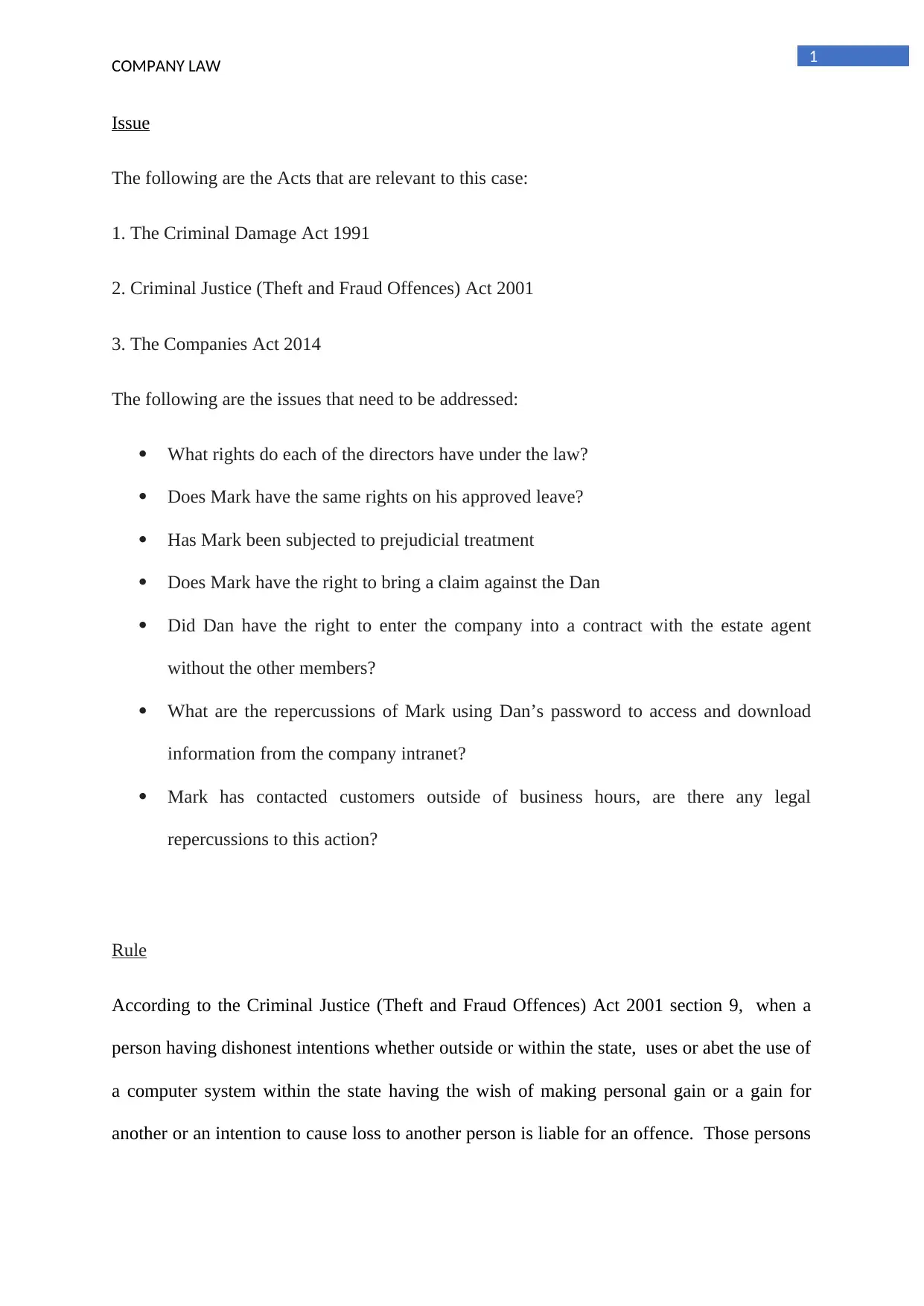
1
COMPANY LAW
Issue
The following are the Acts that are relevant to this case:
1. The Criminal Damage Act 1991
2. Criminal Justice (Theft and Fraud Offences) Act 2001
3. The Companies Act 2014
The following are the issues that need to be addressed:
What rights do each of the directors have under the law?
Does Mark have the same rights on his approved leave?
Has Mark been subjected to prejudicial treatment
Does Mark have the right to bring a claim against the Dan
Did Dan have the right to enter the company into a contract with the estate agent
without the other members?
What are the repercussions of Mark using Dan’s password to access and download
information from the company intranet?
Mark has contacted customers outside of business hours, are there any legal
repercussions to this action?
Rule
According to the Criminal Justice (Theft and Fraud Offences) Act 2001 section 9, when a
person having dishonest intentions whether outside or within the state, uses or abet the use of
a computer system within the state having the wish of making personal gain or a gain for
another or an intention to cause loss to another person is liable for an offence. Those persons
COMPANY LAW
Issue
The following are the Acts that are relevant to this case:
1. The Criminal Damage Act 1991
2. Criminal Justice (Theft and Fraud Offences) Act 2001
3. The Companies Act 2014
The following are the issues that need to be addressed:
What rights do each of the directors have under the law?
Does Mark have the same rights on his approved leave?
Has Mark been subjected to prejudicial treatment
Does Mark have the right to bring a claim against the Dan
Did Dan have the right to enter the company into a contract with the estate agent
without the other members?
What are the repercussions of Mark using Dan’s password to access and download
information from the company intranet?
Mark has contacted customers outside of business hours, are there any legal
repercussions to this action?
Rule
According to the Criminal Justice (Theft and Fraud Offences) Act 2001 section 9, when a
person having dishonest intentions whether outside or within the state, uses or abet the use of
a computer system within the state having the wish of making personal gain or a gain for
another or an intention to cause loss to another person is liable for an offence. Those persons
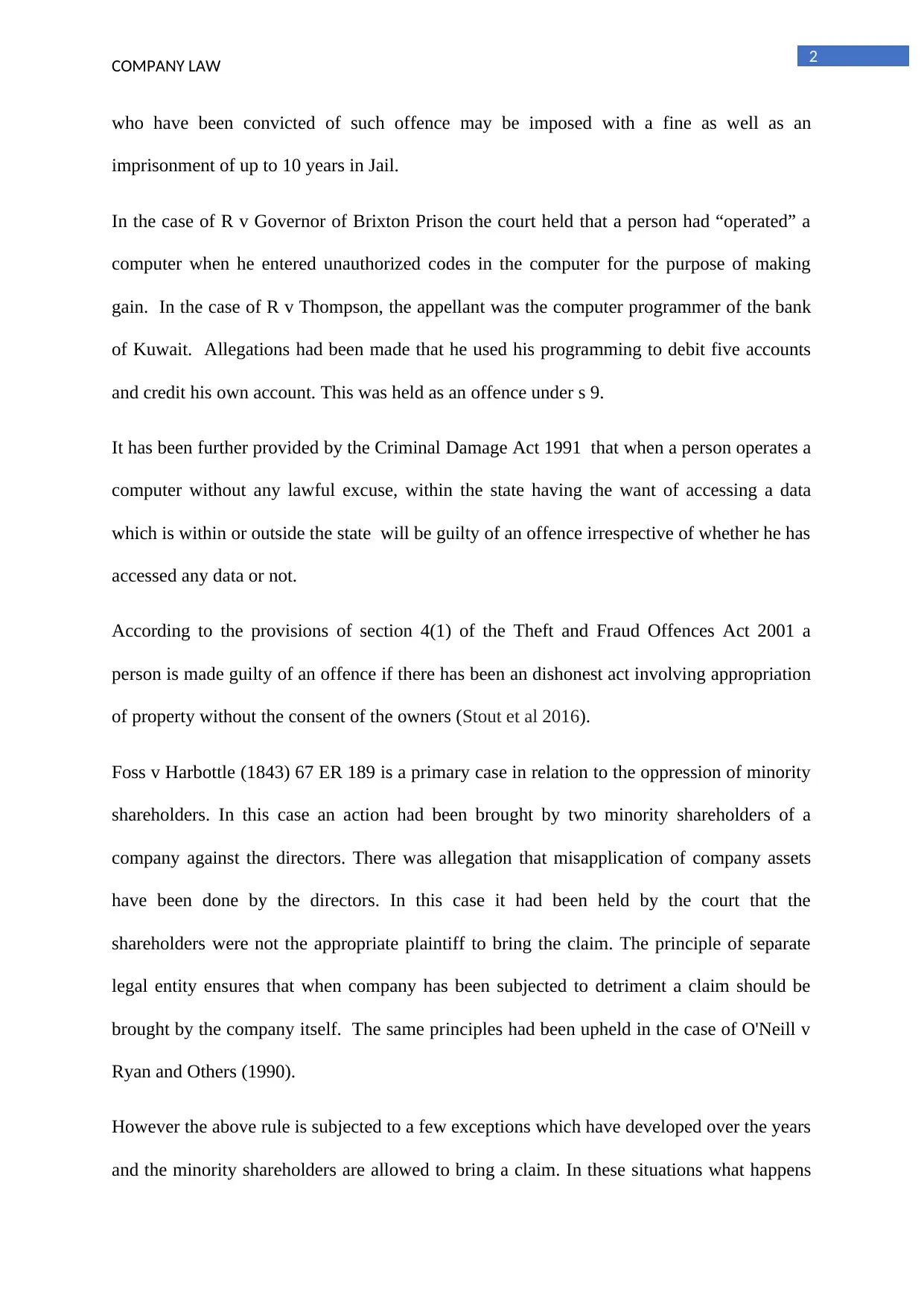
2
COMPANY LAW
who have been convicted of such offence may be imposed with a fine as well as an
imprisonment of up to 10 years in Jail.
In the case of R v Governor of Brixton Prison the court held that a person had “operated” a
computer when he entered unauthorized codes in the computer for the purpose of making
gain. In the case of R v Thompson, the appellant was the computer programmer of the bank
of Kuwait. Allegations had been made that he used his programming to debit five accounts
and credit his own account. This was held as an offence under s 9.
It has been further provided by the Criminal Damage Act 1991 that when a person operates a
computer without any lawful excuse, within the state having the want of accessing a data
which is within or outside the state will be guilty of an offence irrespective of whether he has
accessed any data or not.
According to the provisions of section 4(1) of the Theft and Fraud Offences Act 2001 a
person is made guilty of an offence if there has been an dishonest act involving appropriation
of property without the consent of the owners (Stout et al 2016).
Foss v Harbottle (1843) 67 ER 189 is a primary case in relation to the oppression of minority
shareholders. In this case an action had been brought by two minority shareholders of a
company against the directors. There was allegation that misapplication of company assets
have been done by the directors. In this case it had been held by the court that the
shareholders were not the appropriate plaintiff to bring the claim. The principle of separate
legal entity ensures that when company has been subjected to detriment a claim should be
brought by the company itself. The same principles had been upheld in the case of O'Neill v
Ryan and Others (1990).
However the above rule is subjected to a few exceptions which have developed over the years
and the minority shareholders are allowed to bring a claim. In these situations what happens
COMPANY LAW
who have been convicted of such offence may be imposed with a fine as well as an
imprisonment of up to 10 years in Jail.
In the case of R v Governor of Brixton Prison the court held that a person had “operated” a
computer when he entered unauthorized codes in the computer for the purpose of making
gain. In the case of R v Thompson, the appellant was the computer programmer of the bank
of Kuwait. Allegations had been made that he used his programming to debit five accounts
and credit his own account. This was held as an offence under s 9.
It has been further provided by the Criminal Damage Act 1991 that when a person operates a
computer without any lawful excuse, within the state having the want of accessing a data
which is within or outside the state will be guilty of an offence irrespective of whether he has
accessed any data or not.
According to the provisions of section 4(1) of the Theft and Fraud Offences Act 2001 a
person is made guilty of an offence if there has been an dishonest act involving appropriation
of property without the consent of the owners (Stout et al 2016).
Foss v Harbottle (1843) 67 ER 189 is a primary case in relation to the oppression of minority
shareholders. In this case an action had been brought by two minority shareholders of a
company against the directors. There was allegation that misapplication of company assets
have been done by the directors. In this case it had been held by the court that the
shareholders were not the appropriate plaintiff to bring the claim. The principle of separate
legal entity ensures that when company has been subjected to detriment a claim should be
brought by the company itself. The same principles had been upheld in the case of O'Neill v
Ryan and Others (1990).
However the above rule is subjected to a few exceptions which have developed over the years
and the minority shareholders are allowed to bring a claim. In these situations what happens
⊘ This is a preview!⊘
Do you want full access?
Subscribe today to unlock all pages.

Trusted by 1+ million students worldwide
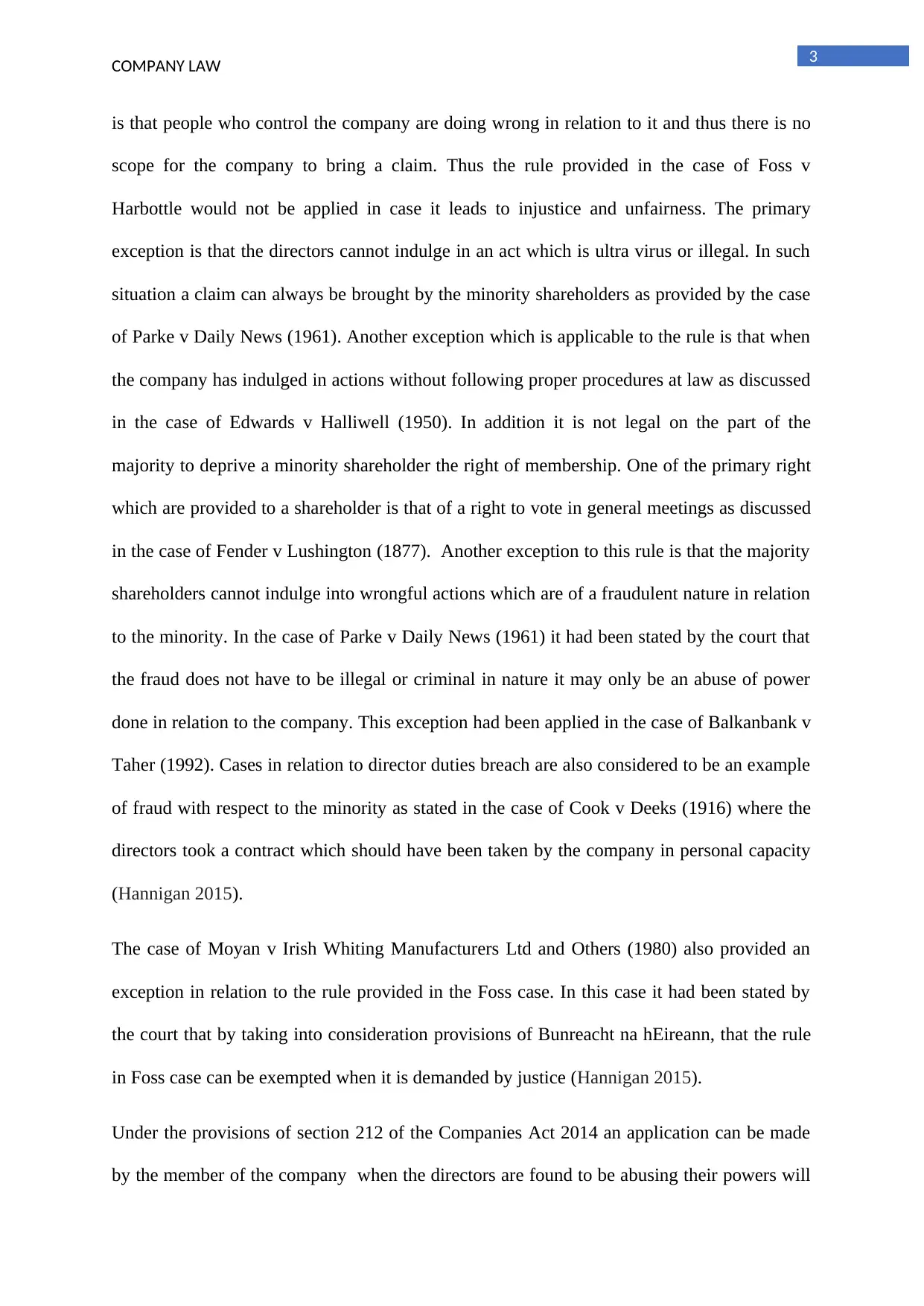
3
COMPANY LAW
is that people who control the company are doing wrong in relation to it and thus there is no
scope for the company to bring a claim. Thus the rule provided in the case of Foss v
Harbottle would not be applied in case it leads to injustice and unfairness. The primary
exception is that the directors cannot indulge in an act which is ultra virus or illegal. In such
situation a claim can always be brought by the minority shareholders as provided by the case
of Parke v Daily News (1961). Another exception which is applicable to the rule is that when
the company has indulged in actions without following proper procedures at law as discussed
in the case of Edwards v Halliwell (1950). In addition it is not legal on the part of the
majority to deprive a minority shareholder the right of membership. One of the primary right
which are provided to a shareholder is that of a right to vote in general meetings as discussed
in the case of Fender v Lushington (1877). Another exception to this rule is that the majority
shareholders cannot indulge into wrongful actions which are of a fraudulent nature in relation
to the minority. In the case of Parke v Daily News (1961) it had been stated by the court that
the fraud does not have to be illegal or criminal in nature it may only be an abuse of power
done in relation to the company. This exception had been applied in the case of Balkanbank v
Taher (1992). Cases in relation to director duties breach are also considered to be an example
of fraud with respect to the minority as stated in the case of Cook v Deeks (1916) where the
directors took a contract which should have been taken by the company in personal capacity
(Hannigan 2015).
The case of Moyan v Irish Whiting Manufacturers Ltd and Others (1980) also provided an
exception in relation to the rule provided in the Foss case. In this case it had been stated by
the court that by taking into consideration provisions of Bunreacht na hEireann, that the rule
in Foss case can be exempted when it is demanded by justice (Hannigan 2015).
Under the provisions of section 212 of the Companies Act 2014 an application can be made
by the member of the company when the directors are found to be abusing their powers will
COMPANY LAW
is that people who control the company are doing wrong in relation to it and thus there is no
scope for the company to bring a claim. Thus the rule provided in the case of Foss v
Harbottle would not be applied in case it leads to injustice and unfairness. The primary
exception is that the directors cannot indulge in an act which is ultra virus or illegal. In such
situation a claim can always be brought by the minority shareholders as provided by the case
of Parke v Daily News (1961). Another exception which is applicable to the rule is that when
the company has indulged in actions without following proper procedures at law as discussed
in the case of Edwards v Halliwell (1950). In addition it is not legal on the part of the
majority to deprive a minority shareholder the right of membership. One of the primary right
which are provided to a shareholder is that of a right to vote in general meetings as discussed
in the case of Fender v Lushington (1877). Another exception to this rule is that the majority
shareholders cannot indulge into wrongful actions which are of a fraudulent nature in relation
to the minority. In the case of Parke v Daily News (1961) it had been stated by the court that
the fraud does not have to be illegal or criminal in nature it may only be an abuse of power
done in relation to the company. This exception had been applied in the case of Balkanbank v
Taher (1992). Cases in relation to director duties breach are also considered to be an example
of fraud with respect to the minority as stated in the case of Cook v Deeks (1916) where the
directors took a contract which should have been taken by the company in personal capacity
(Hannigan 2015).
The case of Moyan v Irish Whiting Manufacturers Ltd and Others (1980) also provided an
exception in relation to the rule provided in the Foss case. In this case it had been stated by
the court that by taking into consideration provisions of Bunreacht na hEireann, that the rule
in Foss case can be exempted when it is demanded by justice (Hannigan 2015).
Under the provisions of section 212 of the Companies Act 2014 an application can be made
by the member of the company when the directors are found to be abusing their powers will
Paraphrase This Document
Need a fresh take? Get an instant paraphrase of this document with our AI Paraphraser
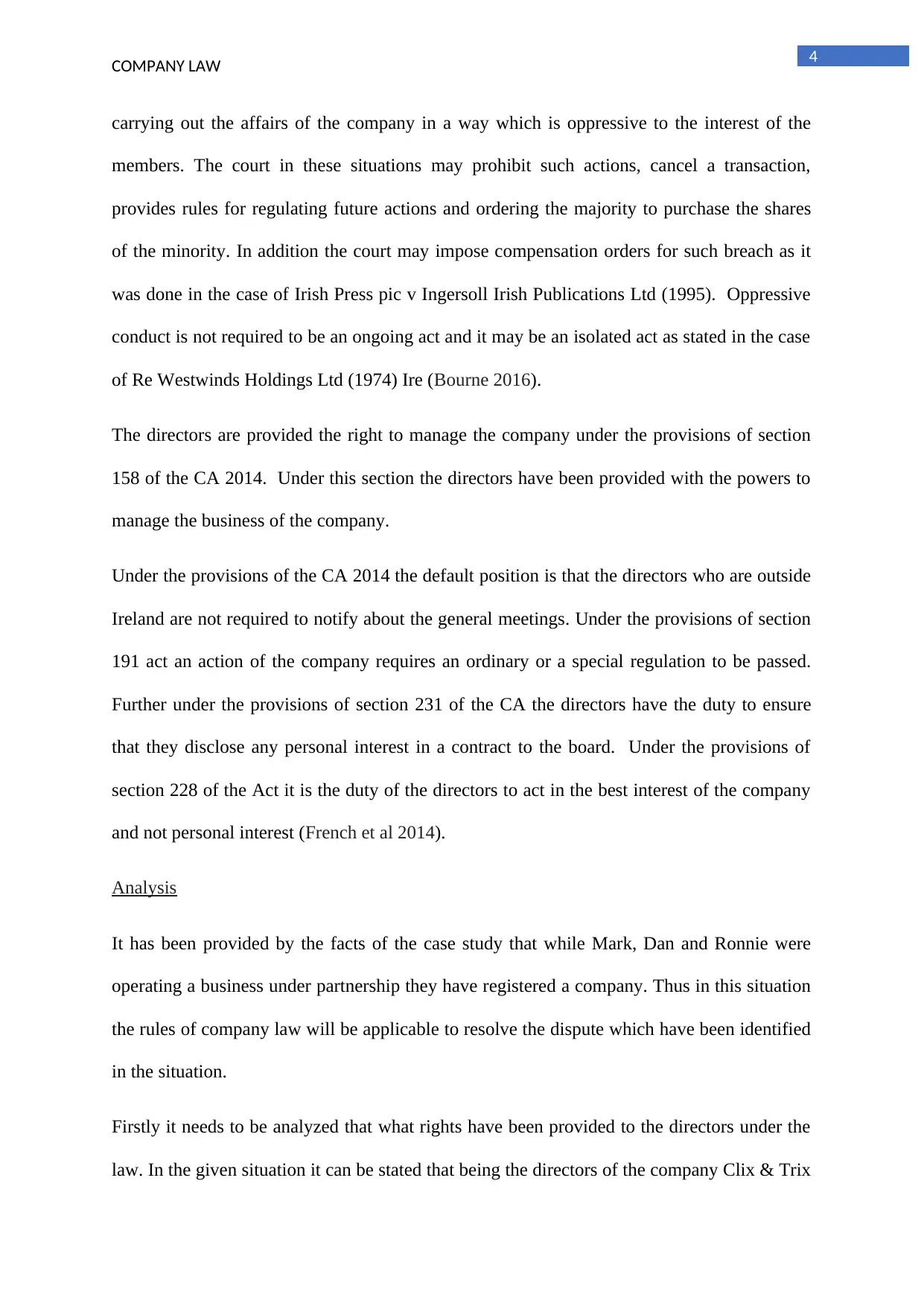
4
COMPANY LAW
carrying out the affairs of the company in a way which is oppressive to the interest of the
members. The court in these situations may prohibit such actions, cancel a transaction,
provides rules for regulating future actions and ordering the majority to purchase the shares
of the minority. In addition the court may impose compensation orders for such breach as it
was done in the case of Irish Press pic v Ingersoll Irish Publications Ltd (1995). Oppressive
conduct is not required to be an ongoing act and it may be an isolated act as stated in the case
of Re Westwinds Holdings Ltd (1974) Ire (Bourne 2016).
The directors are provided the right to manage the company under the provisions of section
158 of the CA 2014. Under this section the directors have been provided with the powers to
manage the business of the company.
Under the provisions of the CA 2014 the default position is that the directors who are outside
Ireland are not required to notify about the general meetings. Under the provisions of section
191 act an action of the company requires an ordinary or a special regulation to be passed.
Further under the provisions of section 231 of the CA the directors have the duty to ensure
that they disclose any personal interest in a contract to the board. Under the provisions of
section 228 of the Act it is the duty of the directors to act in the best interest of the company
and not personal interest (French et al 2014).
Analysis
It has been provided by the facts of the case study that while Mark, Dan and Ronnie were
operating a business under partnership they have registered a company. Thus in this situation
the rules of company law will be applicable to resolve the dispute which have been identified
in the situation.
Firstly it needs to be analyzed that what rights have been provided to the directors under the
law. In the given situation it can be stated that being the directors of the company Clix & Trix
COMPANY LAW
carrying out the affairs of the company in a way which is oppressive to the interest of the
members. The court in these situations may prohibit such actions, cancel a transaction,
provides rules for regulating future actions and ordering the majority to purchase the shares
of the minority. In addition the court may impose compensation orders for such breach as it
was done in the case of Irish Press pic v Ingersoll Irish Publications Ltd (1995). Oppressive
conduct is not required to be an ongoing act and it may be an isolated act as stated in the case
of Re Westwinds Holdings Ltd (1974) Ire (Bourne 2016).
The directors are provided the right to manage the company under the provisions of section
158 of the CA 2014. Under this section the directors have been provided with the powers to
manage the business of the company.
Under the provisions of the CA 2014 the default position is that the directors who are outside
Ireland are not required to notify about the general meetings. Under the provisions of section
191 act an action of the company requires an ordinary or a special regulation to be passed.
Further under the provisions of section 231 of the CA the directors have the duty to ensure
that they disclose any personal interest in a contract to the board. Under the provisions of
section 228 of the Act it is the duty of the directors to act in the best interest of the company
and not personal interest (French et al 2014).
Analysis
It has been provided by the facts of the case study that while Mark, Dan and Ronnie were
operating a business under partnership they have registered a company. Thus in this situation
the rules of company law will be applicable to resolve the dispute which have been identified
in the situation.
Firstly it needs to be analyzed that what rights have been provided to the directors under the
law. In the given situation it can be stated that being the directors of the company Clix & Trix
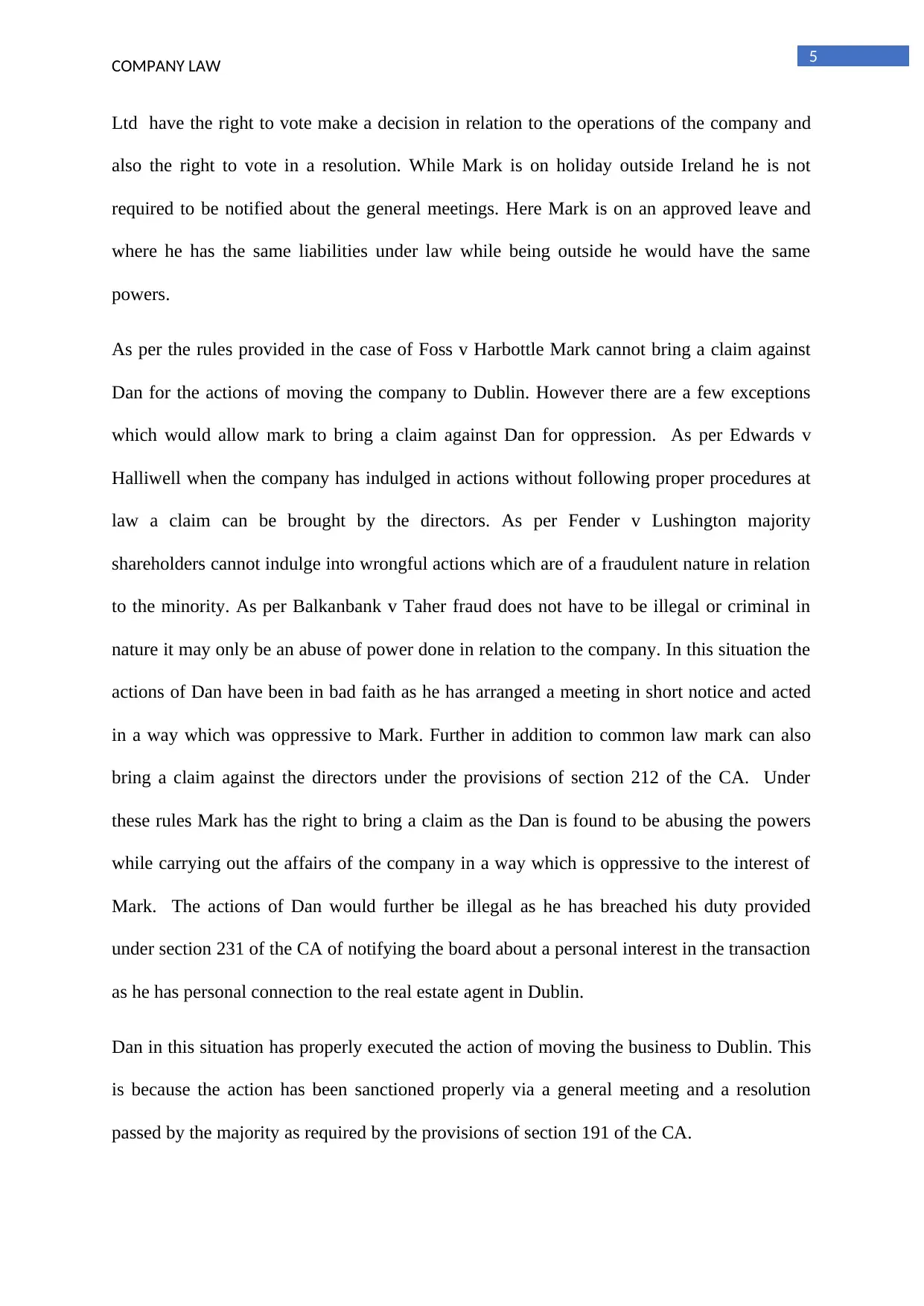
5
COMPANY LAW
Ltd have the right to vote make a decision in relation to the operations of the company and
also the right to vote in a resolution. While Mark is on holiday outside Ireland he is not
required to be notified about the general meetings. Here Mark is on an approved leave and
where he has the same liabilities under law while being outside he would have the same
powers.
As per the rules provided in the case of Foss v Harbottle Mark cannot bring a claim against
Dan for the actions of moving the company to Dublin. However there are a few exceptions
which would allow mark to bring a claim against Dan for oppression. As per Edwards v
Halliwell when the company has indulged in actions without following proper procedures at
law a claim can be brought by the directors. As per Fender v Lushington majority
shareholders cannot indulge into wrongful actions which are of a fraudulent nature in relation
to the minority. As per Balkanbank v Taher fraud does not have to be illegal or criminal in
nature it may only be an abuse of power done in relation to the company. In this situation the
actions of Dan have been in bad faith as he has arranged a meeting in short notice and acted
in a way which was oppressive to Mark. Further in addition to common law mark can also
bring a claim against the directors under the provisions of section 212 of the CA. Under
these rules Mark has the right to bring a claim as the Dan is found to be abusing the powers
while carrying out the affairs of the company in a way which is oppressive to the interest of
Mark. The actions of Dan would further be illegal as he has breached his duty provided
under section 231 of the CA of notifying the board about a personal interest in the transaction
as he has personal connection to the real estate agent in Dublin.
Dan in this situation has properly executed the action of moving the business to Dublin. This
is because the action has been sanctioned properly via a general meeting and a resolution
passed by the majority as required by the provisions of section 191 of the CA.
COMPANY LAW
Ltd have the right to vote make a decision in relation to the operations of the company and
also the right to vote in a resolution. While Mark is on holiday outside Ireland he is not
required to be notified about the general meetings. Here Mark is on an approved leave and
where he has the same liabilities under law while being outside he would have the same
powers.
As per the rules provided in the case of Foss v Harbottle Mark cannot bring a claim against
Dan for the actions of moving the company to Dublin. However there are a few exceptions
which would allow mark to bring a claim against Dan for oppression. As per Edwards v
Halliwell when the company has indulged in actions without following proper procedures at
law a claim can be brought by the directors. As per Fender v Lushington majority
shareholders cannot indulge into wrongful actions which are of a fraudulent nature in relation
to the minority. As per Balkanbank v Taher fraud does not have to be illegal or criminal in
nature it may only be an abuse of power done in relation to the company. In this situation the
actions of Dan have been in bad faith as he has arranged a meeting in short notice and acted
in a way which was oppressive to Mark. Further in addition to common law mark can also
bring a claim against the directors under the provisions of section 212 of the CA. Under
these rules Mark has the right to bring a claim as the Dan is found to be abusing the powers
while carrying out the affairs of the company in a way which is oppressive to the interest of
Mark. The actions of Dan would further be illegal as he has breached his duty provided
under section 231 of the CA of notifying the board about a personal interest in the transaction
as he has personal connection to the real estate agent in Dublin.
Dan in this situation has properly executed the action of moving the business to Dublin. This
is because the action has been sanctioned properly via a general meeting and a resolution
passed by the majority as required by the provisions of section 191 of the CA.
⊘ This is a preview!⊘
Do you want full access?
Subscribe today to unlock all pages.

Trusted by 1+ million students worldwide
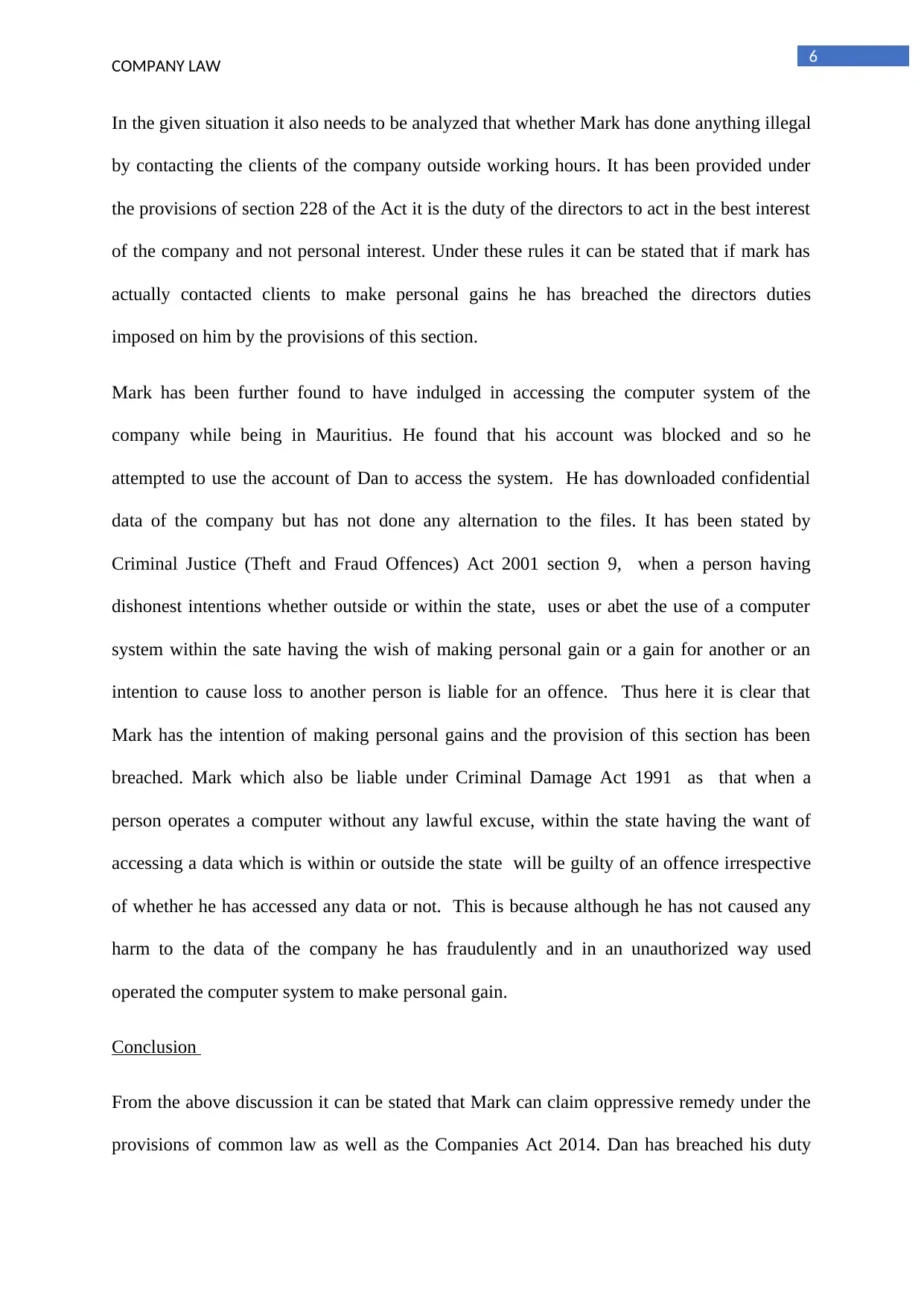
6
COMPANY LAW
In the given situation it also needs to be analyzed that whether Mark has done anything illegal
by contacting the clients of the company outside working hours. It has been provided under
the provisions of section 228 of the Act it is the duty of the directors to act in the best interest
of the company and not personal interest. Under these rules it can be stated that if mark has
actually contacted clients to make personal gains he has breached the directors duties
imposed on him by the provisions of this section.
Mark has been further found to have indulged in accessing the computer system of the
company while being in Mauritius. He found that his account was blocked and so he
attempted to use the account of Dan to access the system. He has downloaded confidential
data of the company but has not done any alternation to the files. It has been stated by
Criminal Justice (Theft and Fraud Offences) Act 2001 section 9, when a person having
dishonest intentions whether outside or within the state, uses or abet the use of a computer
system within the sate having the wish of making personal gain or a gain for another or an
intention to cause loss to another person is liable for an offence. Thus here it is clear that
Mark has the intention of making personal gains and the provision of this section has been
breached. Mark which also be liable under Criminal Damage Act 1991 as that when a
person operates a computer without any lawful excuse, within the state having the want of
accessing a data which is within or outside the state will be guilty of an offence irrespective
of whether he has accessed any data or not. This is because although he has not caused any
harm to the data of the company he has fraudulently and in an unauthorized way used
operated the computer system to make personal gain.
Conclusion
From the above discussion it can be stated that Mark can claim oppressive remedy under the
provisions of common law as well as the Companies Act 2014. Dan has breached his duty
COMPANY LAW
In the given situation it also needs to be analyzed that whether Mark has done anything illegal
by contacting the clients of the company outside working hours. It has been provided under
the provisions of section 228 of the Act it is the duty of the directors to act in the best interest
of the company and not personal interest. Under these rules it can be stated that if mark has
actually contacted clients to make personal gains he has breached the directors duties
imposed on him by the provisions of this section.
Mark has been further found to have indulged in accessing the computer system of the
company while being in Mauritius. He found that his account was blocked and so he
attempted to use the account of Dan to access the system. He has downloaded confidential
data of the company but has not done any alternation to the files. It has been stated by
Criminal Justice (Theft and Fraud Offences) Act 2001 section 9, when a person having
dishonest intentions whether outside or within the state, uses or abet the use of a computer
system within the sate having the wish of making personal gain or a gain for another or an
intention to cause loss to another person is liable for an offence. Thus here it is clear that
Mark has the intention of making personal gains and the provision of this section has been
breached. Mark which also be liable under Criminal Damage Act 1991 as that when a
person operates a computer without any lawful excuse, within the state having the want of
accessing a data which is within or outside the state will be guilty of an offence irrespective
of whether he has accessed any data or not. This is because although he has not caused any
harm to the data of the company he has fraudulently and in an unauthorized way used
operated the computer system to make personal gain.
Conclusion
From the above discussion it can be stated that Mark can claim oppressive remedy under the
provisions of common law as well as the Companies Act 2014. Dan has breached his duty
Paraphrase This Document
Need a fresh take? Get an instant paraphrase of this document with our AI Paraphraser
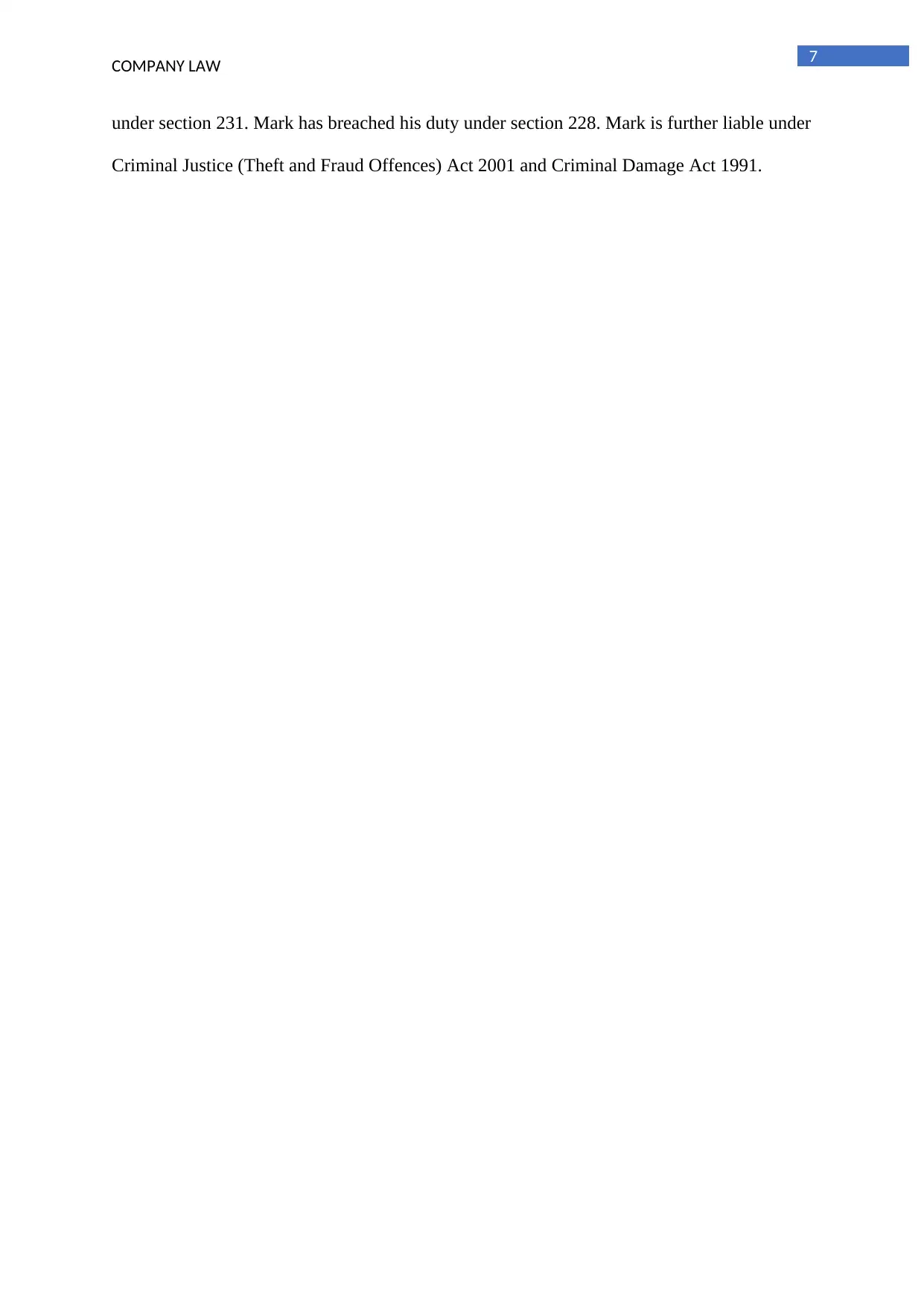
7
COMPANY LAW
under section 231. Mark has breached his duty under section 228. Mark is further liable under
Criminal Justice (Theft and Fraud Offences) Act 2001 and Criminal Damage Act 1991.
COMPANY LAW
under section 231. Mark has breached his duty under section 228. Mark is further liable under
Criminal Justice (Theft and Fraud Offences) Act 2001 and Criminal Damage Act 1991.
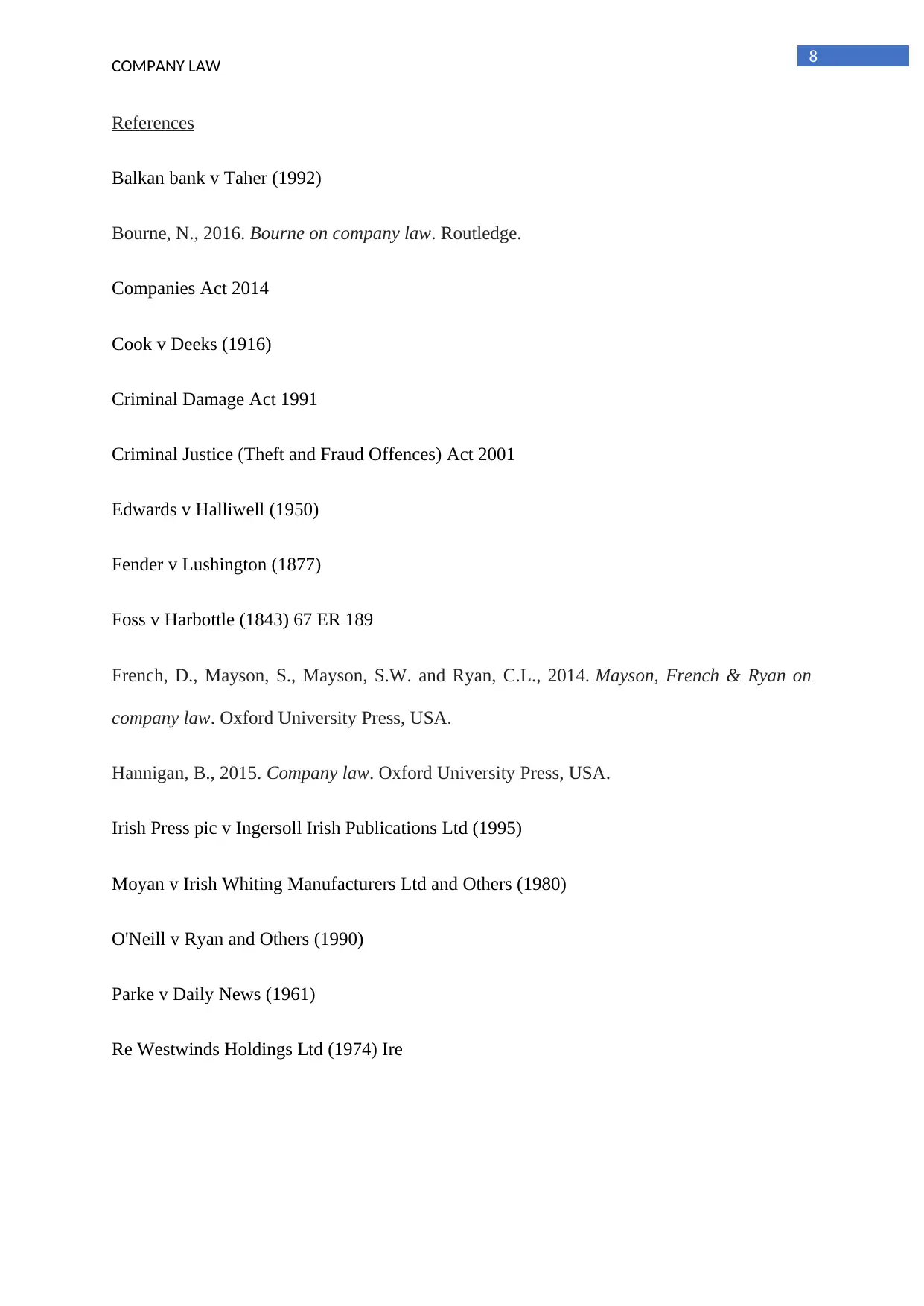
8
COMPANY LAW
References
Balkan bank v Taher (1992)
Bourne, N., 2016. Bourne on company law. Routledge.
Companies Act 2014
Cook v Deeks (1916)
Criminal Damage Act 1991
Criminal Justice (Theft and Fraud Offences) Act 2001
Edwards v Halliwell (1950)
Fender v Lushington (1877)
Foss v Harbottle (1843) 67 ER 189
French, D., Mayson, S., Mayson, S.W. and Ryan, C.L., 2014. Mayson, French & Ryan on
company law. Oxford University Press, USA.
Hannigan, B., 2015. Company law. Oxford University Press, USA.
Irish Press pic v Ingersoll Irish Publications Ltd (1995)
Moyan v Irish Whiting Manufacturers Ltd and Others (1980)
O'Neill v Ryan and Others (1990)
Parke v Daily News (1961)
Re Westwinds Holdings Ltd (1974) Ire
COMPANY LAW
References
Balkan bank v Taher (1992)
Bourne, N., 2016. Bourne on company law. Routledge.
Companies Act 2014
Cook v Deeks (1916)
Criminal Damage Act 1991
Criminal Justice (Theft and Fraud Offences) Act 2001
Edwards v Halliwell (1950)
Fender v Lushington (1877)
Foss v Harbottle (1843) 67 ER 189
French, D., Mayson, S., Mayson, S.W. and Ryan, C.L., 2014. Mayson, French & Ryan on
company law. Oxford University Press, USA.
Hannigan, B., 2015. Company law. Oxford University Press, USA.
Irish Press pic v Ingersoll Irish Publications Ltd (1995)
Moyan v Irish Whiting Manufacturers Ltd and Others (1980)
O'Neill v Ryan and Others (1990)
Parke v Daily News (1961)
Re Westwinds Holdings Ltd (1974) Ire
⊘ This is a preview!⊘
Do you want full access?
Subscribe today to unlock all pages.

Trusted by 1+ million students worldwide
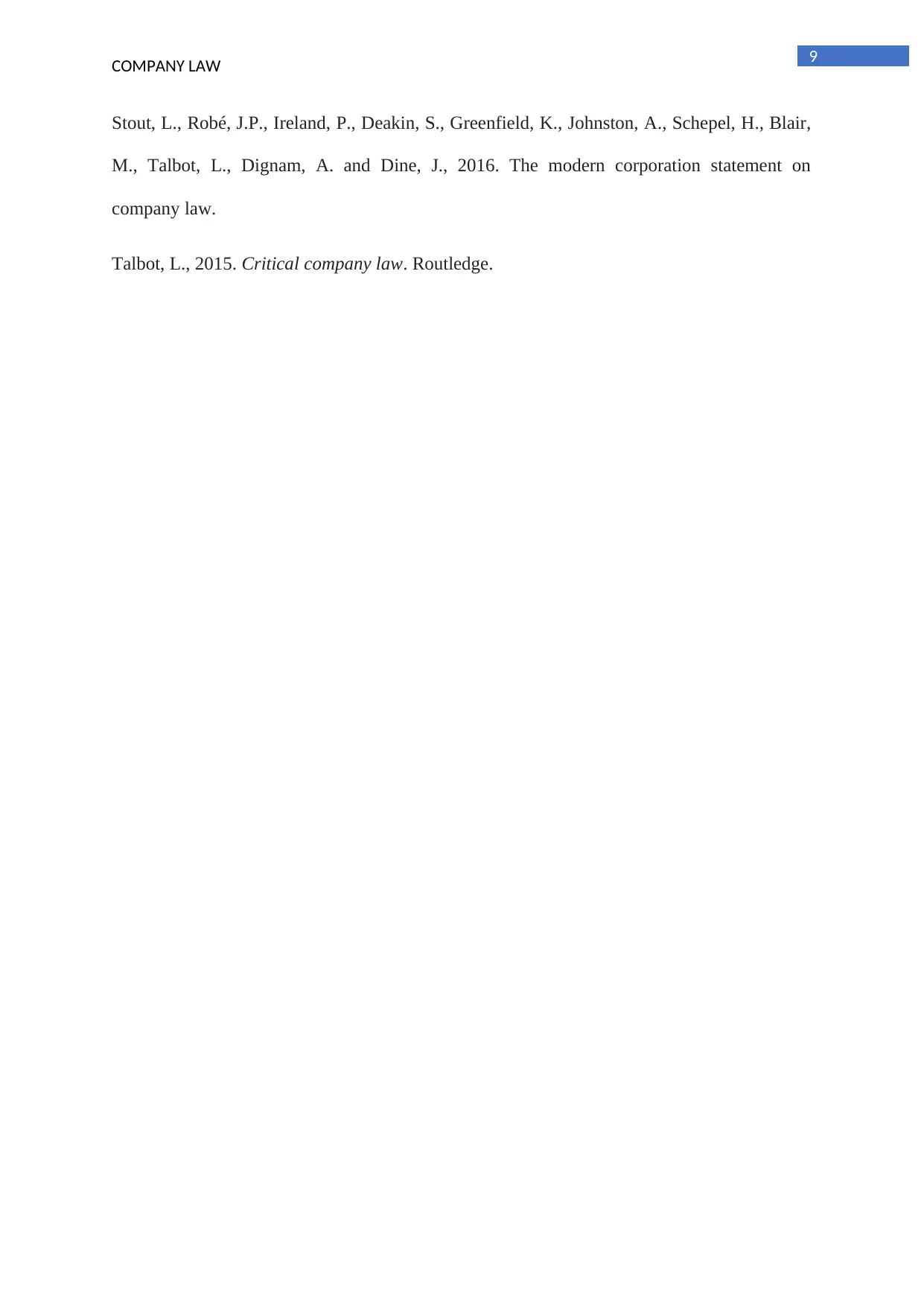
9
COMPANY LAW
Stout, L., Robé, J.P., Ireland, P., Deakin, S., Greenfield, K., Johnston, A., Schepel, H., Blair,
M., Talbot, L., Dignam, A. and Dine, J., 2016. The modern corporation statement on
company law.
Talbot, L., 2015. Critical company law. Routledge.
COMPANY LAW
Stout, L., Robé, J.P., Ireland, P., Deakin, S., Greenfield, K., Johnston, A., Schepel, H., Blair,
M., Talbot, L., Dignam, A. and Dine, J., 2016. The modern corporation statement on
company law.
Talbot, L., 2015. Critical company law. Routledge.
1 out of 10
Related Documents
Your All-in-One AI-Powered Toolkit for Academic Success.
+13062052269
info@desklib.com
Available 24*7 on WhatsApp / Email
![[object Object]](/_next/static/media/star-bottom.7253800d.svg)
Unlock your academic potential
Copyright © 2020–2025 A2Z Services. All Rights Reserved. Developed and managed by ZUCOL.





